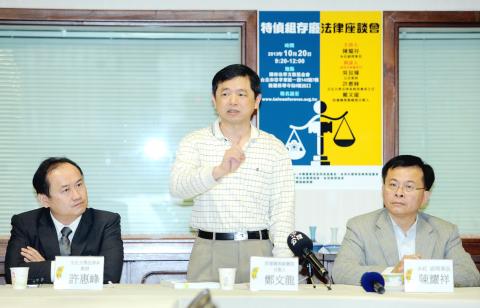The Special Investigation Division (SID) of the Supreme Prosecutors’ Office, which has been in the eye of a recent political storm, should be abolished because of its inherent illegitimacy and unconstitutionality, as well as the design of the special prosecutors system, legal experts said yesterday in Taipei.
“Let me say this: Taiwan would not become a worse place to live without the SID, but it will become more chaotic if the division is kept,” lawyer Cheng Wen-lung (鄭文龍) told a forum organized by Taiwan Forever Association to discuss the increasing calls to scrap the division.
The SID has failed to accomplish its mission of probing corruption cases involving officials at minister-level or higher since 2008, with the bribery case involving former Executive Yuan deputy secretary-general Lin Yi-shih (林益世) — which was investigated after media broke the story — the only exception, Cheng said.

Photo: Liao Chen-huei, Taipei Times
The division instead focuses on prosecuting cases involving former officials of the previous Democratic Progressive Party (DPP) administration, including former president Chen Shui-bian (陳水扁), with selective investigation a prevalent practice, he added.
There have been growing cries for eliminating the SID, which has been embroiled in controversies related to its wiretapping of the legislature, not only because it malfunctions and infringes on the Constitution, but also because it has become a tool for politicians to pursue their political agendas, the lawyer said.
Hsu Hui-feng (許惠峰), a professor of law at the Chinese Culture University, said the division was doomed to fail because of systemic flaws.
“I would say that the SID has become an agency everyone loves to hate not because the prosecutors in the division are incompetent, but because of the design of the prosecutorial system and a lack of courage and justice among prosecutors,” Hsu said.
Since the prosecutor-general — who is appointed by the president — is authorized to designate all the SID’s prosecutors, it is inevitable that the division acquires a political nature, he said, adding that this system gives the president and the majority party influence over the SID.
Another serious flaw of the division is that, unlike local prosecutors’ offices — which can be supervised by the High Prosecutors’ Office — no institution is able to monitor the division, Hsu said.
That explained why the Chinese Nationalist Party (KMT) did not favor removing Article 63-1 from the Organic Act of Court Organization (法院組織法), which stipulates the SID’s establishment and mission, DPP Legislator Wu Yi-chen (吳宜臻) said.
A Legislative Yuan resolution on Sept. 25 demanded that the SID stop working and transfer its ongoing cases to local prosecutors’ offices, but the division has refused, saying that the resolution is not legally binding.
High Prosecutors’ Office prosecutor Lu Ting-wang (呂丁旺) said it was almost certain that the SID would abuse its authority because of the power concentrated in it, as well as the lack of checks and balances to keep it under control.
However, Lu said that has no one to blame but itself because the division was established in 2007 under the then-DPP government.

Alain Robert, known as the "French Spider-Man," praised Alex Honnold as exceptionally well-prepared after the US climber completed a free solo ascent of Taipei 101 yesterday. Robert said Honnold's ascent of the 508m-tall skyscraper in just more than one-and-a-half hours without using safety ropes or equipment was a remarkable achievement. "This is my life," he said in an interview conducted in French, adding that he liked the feeling of being "on the edge of danger." The 63-year-old Frenchman climbed Taipei 101 using ropes in December 2004, taking about four hours to reach the top. On a one-to-10 scale of difficulty, Robert said Taipei 101

A preclearance service to facilitate entry for people traveling to select airports in Japan would be available from Thursday next week to Feb. 25 at Taiwan Taoyuan International Airport, Taoyuan International Airport Corp (TIAC) said on Tuesday. The service was first made available to Taiwanese travelers throughout the winter vacation of 2024 and during the Lunar New Year holiday. In addition to flights to the Japanese cities of Hakodate, Asahikawa, Akita, Sendai, Niigata, Okayama, Takamatsu, Kumamoto and Kagoshima, the service would be available to travelers to Kobe and Oita. The service can be accessed by passengers of 15 flight routes operated by

Taiwanese and US defense groups are collaborating to introduce deployable, semi-autonomous manufacturing systems for drones and components in a boost to the nation’s supply chain resilience. Taiwan’s G-Tech Optroelectronics Corp subsidiary GTOC and the US’ Aerkomm Inc on Friday announced an agreement with fellow US-based Firestorm Lab to adopt the latter’s xCell, a technology featuring 3D printers fitted in 6.1m container units. The systems enable aerial platforms and parts to be produced in high volumes from dispersed nodes capable of rapid redeployment, to minimize the risk of enemy strikes and to meet field requirements, they said. Firestorm chief technology officer Ian Muceus said

MORE FALL: An investigation into one of Xi’s key cronies, part of a broader ‘anti-corruption’ drive, indicates that he might have a deep distrust in the military, an expert said China’s latest military purge underscores systemic risks in its shift from collective leadership to sole rule under Chinese President Xi Jinping (習近平), and could disrupt its chain of command and military capabilities, a national security official said yesterday. If decisionmaking within the Chinese Communist Party has become “irrational” under one-man rule, the Taiwan Strait and the regional situation must be approached with extreme caution, given unforeseen risks, they added. The anonymous official made the remarks as China’s Central Military Commission Vice Chairman Zhang Youxia (張又俠) and Joint Staff Department Chief of Staff Liu Zhenli (劉振立) were reportedly being investigated for suspected “serious